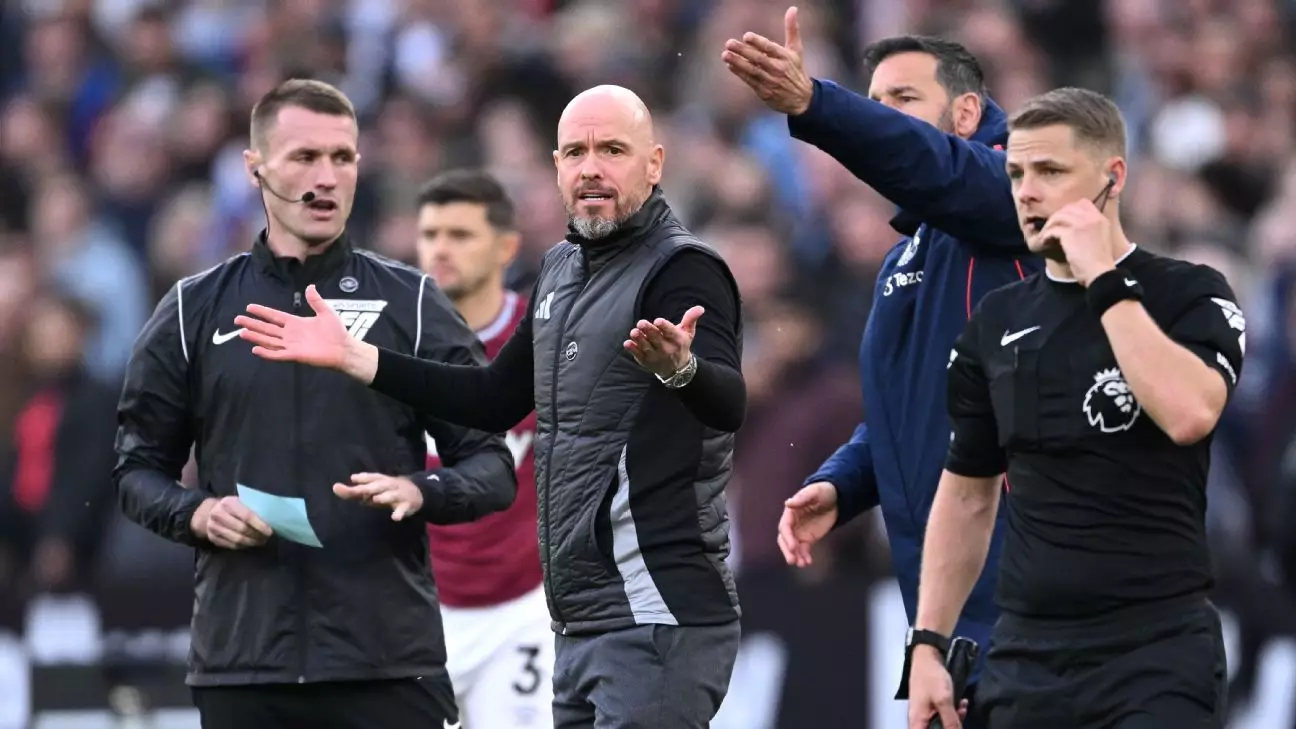As Manchester United navigates yet another turbulent season under Erik ten Hag’s management, fans and analysts alike are left questioning the team’s trajectory. The recent defeat to West Ham United, which saw a once-promising display unravel into a disappointing 2-1 loss, has underscored systemic issues that have persisted for far too long. The reality is stark: despite moments of brilliance in their play, the team frequently finds itself faltering in crucial moments, leading to spiraling criticism and an existential crisis within the club.
In the aftermath of this latest defeat, ten Hag’s decision to focus on the refereeing decisions—specifically the controversial late penalty—has drawn skepticism. While VAR (Video Assistant Referee) plays a crucial role in maintaining fairness, it cannot be a blanket excuse for the team’s failures. Denying accountability can mask underlying problems and hinder progression. United has been prone to recurring mistakes, both on and off the pitch, which extend beyond mere referee errors.
In the early stages of the match against West Ham, United appeared poised to control the game, frequently threatening the opponents’ goal. With Bruno Fernandes facilitating several attacking plays and the youthful Garnacho showing flashes of potential, the narrative seemed set for a straightforward victory. However, as the game wore on, the familiar patterns re-emerged: the inability to convert chances into goals became increasingly apparent.
As ten Hag lamented after the match, United had opportunities that should have easily translated into scores. A missed opportunity here and a botched finish there ultimately transformed what could have been a dominant performance into yet another failure to secure a win. This cycle of missed chances points to a broader malaise—one that remains unaddressed despite ten Hag’s tactical approaches.
Erik ten Hag’s remarks post-match reveal a struggle to accept full responsibility for his team’s shortcomings. In the world of football, managers often serve as the shield against the media and fan backlash; however, at some point, a manager’s ability to influence results must be held accountable. Ten Hag’s coaches may craft intricate strategies on the training pitch, but success demands execution from the players in crucial moments, something lacking in too many instances.
His focus on external factors, such as officiating, allows for a convenient distraction from the substantial internal issues plaguing the squad—a lack of finishing quality and resilience when the going gets tough. This mentality shift is essential for any coach hoping to turn the tide. Repeatedly shifting blame may undermine ten Hag’s authority and the players’ morale during a phase where unity is paramount for improvement.
United’s lineup boasts significant talents capable of performing at a higher level. Yet time and again, they fall short when pressure mounts, reminiscent of weighty expectations that feel increasingly difficult to uphold. Strikers continue to miss sitters, and midfielders fail to create significant impacts in key games. The shortfall in goals—a tally of just eight in nine matches—stands as a stark testament to stagnation—rarely has a team rich in talent struggled to find the back of the net so dramatically.
Players like Casemiro have shown pockets of excellence, yet they are often left isolated amid a team that cannot capitalize on build-up play. The absence of determination to transform poses further questions. Much like their opponents, West Ham, who have fluctuated between promise and mediocrity, Manchester United finds itself trapped in a cycle of unpredictability that hinders potential growth.
The path forward requires tangible change, whether in team mentality, game strategy, or both. Upcoming matches against teams with comparable struggles—Leicester City, Ipswich Town, and Everton—offer an opportunity for ten Hag and his men to recalibrate their fortunes. However, the question remains whether they possess the necessary resolve and creativity.
Aside from immediate results, there needs to be a collective reassessment of their identity. Are they an underperforming giant, or has a new era of mediocrity settled in? Fundamental answers to these questions will shape not only the season ahead but the long-term image of one of football’s most storied clubs.
The challenges laid ahead for Manchester United encapsulate far more than simple match results. They invoke critical introspection, a need for rediscovered resolve, and a refusal to accept mediocrity. Fans and pundits alike wait for signs that the team can transcend its current trials and rediscover its winning formula.
